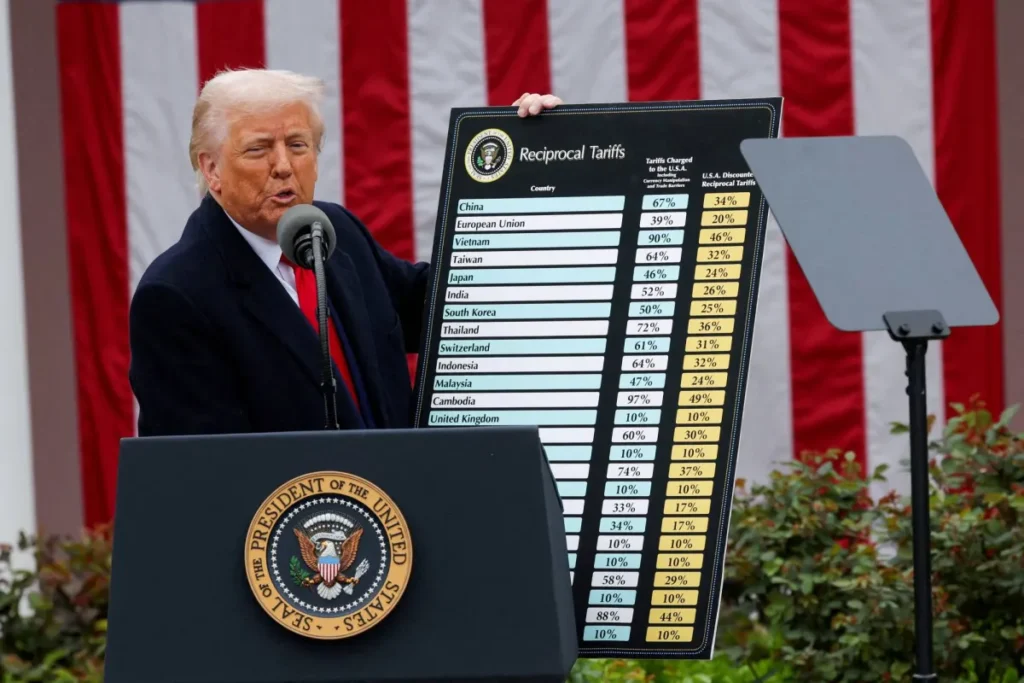Countries around the world threatened to wage a trade war with the United States as President Donald Trump’s sweeping tariffs fed expectations for a global downturn and sharp price hikes for swathes of goods in the world’s biggest consumer market.
The penalties announced by Trump on Wednesday triggered a plunge in world financial markets and drew condemnation from other leaders reckoning with the end of a decades-long era of trade liberalization.
In Japan, one of United States’ top trading partners, Prime Minister Shigeru Ishiba said that the tariffs had created a “national crisis” as a plunge in banking shares on Friday set Tokyo’s stock market on course for its worst week in years.
Investment bank JP Morgan said it now sees a 60% chance of the global economy entering recession by year end, up from 40% previously.
But there were conflicting messages from the White House about whether the tariffs were meant to be permanent or were a tactic to win concessions, with Trump saying they “give us great power to negotiate.”
The US tariffs would amount to the highest trade barriers in more than a century: a 10% baseline tariff on all imports and higher targeted duties on dozens of countries.
That could jack up the price for US shoppers of everything from cannabis to running shoes to Apple’s iPhone. A high-end iPhone could cost nearly $2,300 if Apple passes the costs on to consumers, based on projections from Rosenblatt Securities.
Businesses raced to adjust. Automaker Stellantis said it would temporarily lay off US workers and close plants in Canada and Mexico, while General Motors said it would increase US production.
Canadian Prime Minister Mark Carney said the United States had abandoned its historic role as a champion of international economic cooperation.
“The global economy is fundamentally different today than it was yesterday,” he said as he announced several countermeasures.
Elsewhere, China vowed retaliation for Trump’s 54% tariffs on imports from the world’s No. 2 economy, as did the European Union, which faces a 20% duty.
French President Emmanuel Macron called for European countries to suspend investment in the United States.
Other trading partners, including Japan, South Korea, Mexico and India, said they would hold off on any retaliation for now as they seek concessions. Britain’s foreign minister said it was working to strike an economic deal with the United States.
But Washington’s allies and rivals alike warned of a devastating blow to global trade.
The tariffs “clearly represent a significant risk to the global outlook at a time of sluggish growth,” said IMF Managing Director Kristalina Georgieva, calling on Washington to work to resolve trade tensions with its partners and reduce uncertainty.
US Commerce Secretary Howard Lutnick and senior trade adviser Peter Navarro both told cable news programs on Thursday the president would not back off, and that the tariff increases were not a negotiation.
Trump then appeared to contradict them, telling reporters, “The tariffs give us great power to negotiate. Always have. I used it very well in the first administration, as you saw, but now we’re taking it to a whole new level.”
Stocks suffered a global meltdown, the US dollar crumbled and oil prices were set for their worst week in months as analysts warned the tariffs could dent demand, upend supply chains and hurt corporate profits.
The Dow fell nearly 4%, its biggest one-day percentage loss since June 2020. The S&P 500 lost nearly 5% and the tech-heavy Nasdaq declined nearly 6%, its worst day in percentage terms since the pandemic era of March 2020.
American companies with significant overseas production took a hit. Nike shares lost 14% and Apple fell 9%.
The pain for markets continued into Friday, with Japan’s Nikkei set for its biggest weekly drop in five years in a rout led by stocks in Japanese banks, some of the biggest lenders in the world by assets.
Japanese bond yields, meanwhile, fell sharply as investors bet the Bank of Japan may be forced to rethink its plans to raise interest rates.
Trump says the “reciprocal” tariffs are a response to barriers put on US goods, while administration officials said the tariffs would create manufacturing jobs at home and open up export markets abroad, although they cautioned it would take time to see results.
Vice President JD Vance in an interview with Newsmax faulted critics for taking a short-term view.
“That’s fundamentally what this is about, the national security of manufacturing and making the things that we need, from steel to pharmaceuticals,” Vance said.
Since returning to the White House in January, Trump’s on-again, off-again tariff threats have rattled consumer and business confidence. Trump could step back again, as the reciprocal tariffs are not due to take effect until April 9.
“The tariff plan does not appear to be well thought-out. Trade negotiations are a highly technical discipline, and in our view these proposals do not offer a serious basis for negotiations with any country,” said James Lucier, founding partner at Capital Alpha.
Economists say the tariffs could reignite inflation, raise the risk of a US recession and boost costs for the average US family by thousands of dollars.
Analysts said the tariffs could also alienate allies in Asia and undercut strategic efforts to contain China.
Trump has slapped a 24% tariff on Japan and a 25% tariff on South Korea, both home to major US military bases. He also hit Taiwan with a 32% tariff as the island faces increased military pressure from China.
Canada and Mexico, the largest US trading partners, were not hit with targeted tariffs on Wednesday, but they already face 25% tariffs on many goods and now face a separate set of tariffs on auto imports.



